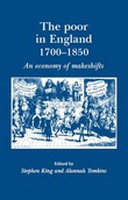Explore

The Poor in England, 1700-1850
Steven King and Alannah Tomkins
2003
5 Ungluers have
Faved this Work
Login to Fave
This fascinating study investigates the experience of English poverty between 1700 and 1900 and in the ways in which the poor made ends meet. The phrase 'economy of makeshifts' has often been used to summarise the patchy, desperate and sometimes failing strategies of the poor for material survival. Incomes or benefits derived from such strategies allegedly ranged from wages supported by under-employment via petty crime through to charity, but allusions to this array of makeshifts usually fall short of answering vital questions about how and when the poor secured access to them. This book represents the single most significant attempt in print to supply the English 'economy of makeshifts' with a solid, empirical basis and to advance the concept of makeshifts from a vague but convenient label to a more precise yet inclusive definition. Individual chapters written by some of the leading, young historians of welfare examine how advantages gained from access to common land, mobilisation of kinship support, resorting to crime, and other marginal resources could prop up struggling households. They suggest how the balance of these strategies might change over time or be modified by gender, life-cycle and geography. A comprehensive introduction summarises the state of research on English poverty, and a thought-provoking conclusion makes valuable suggestions for the direction of future research. This book will be crucial for historians of social life and welfare, of interest to researchers working on eighteenth- /nineteenth- century England and will be useful to undergraduates seeking guidance on the historiography of poverty.
This book is included in DOAB.
Why read this book? Have your say.
You must be logged in to comment.

